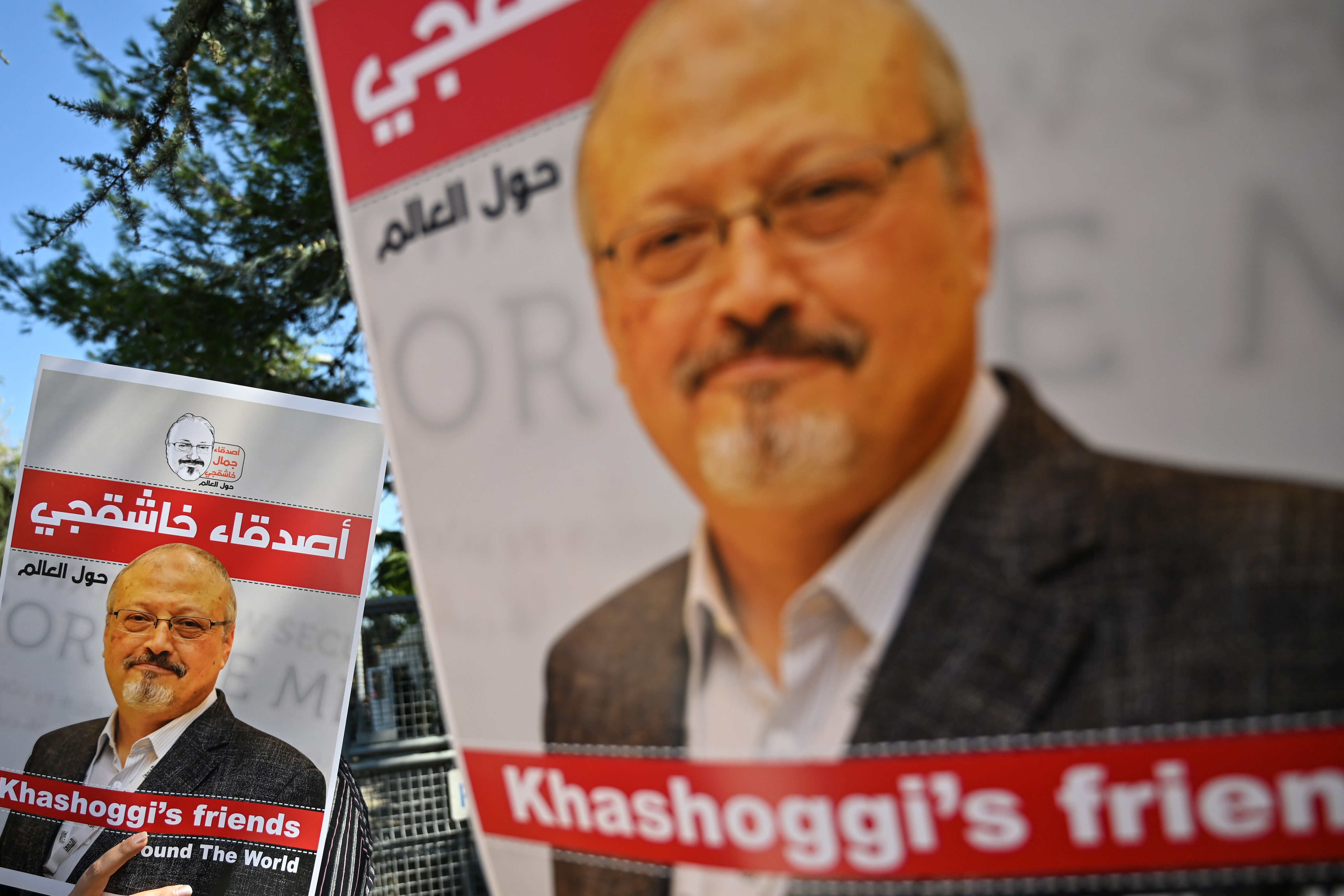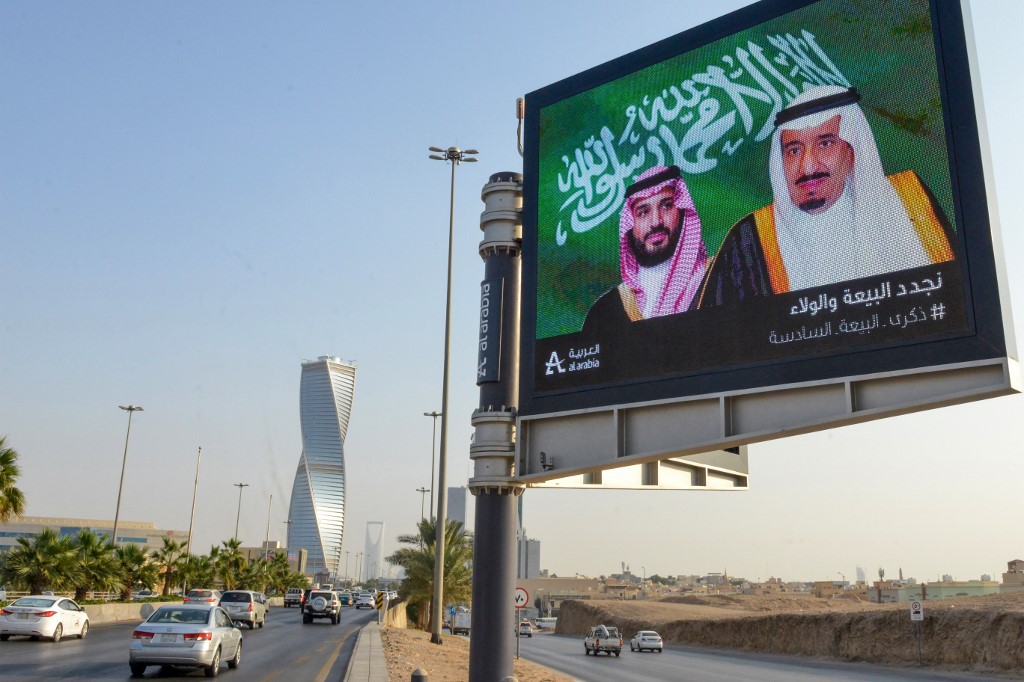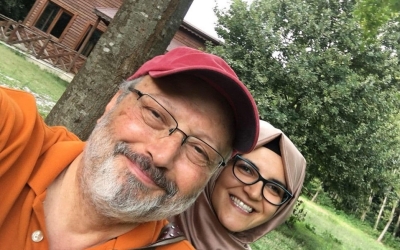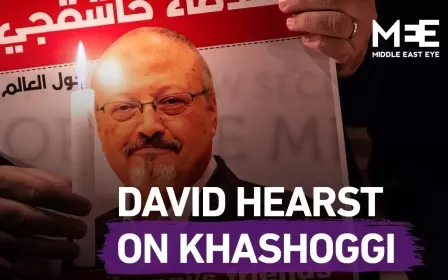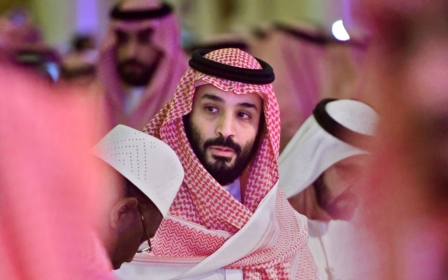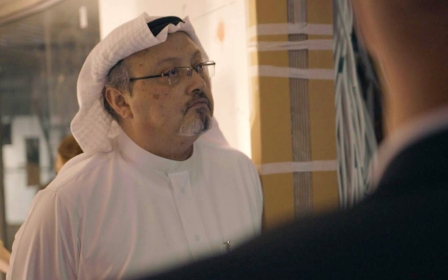Saudi Arabia: For Joe Biden, Khashoggi is a litmus test
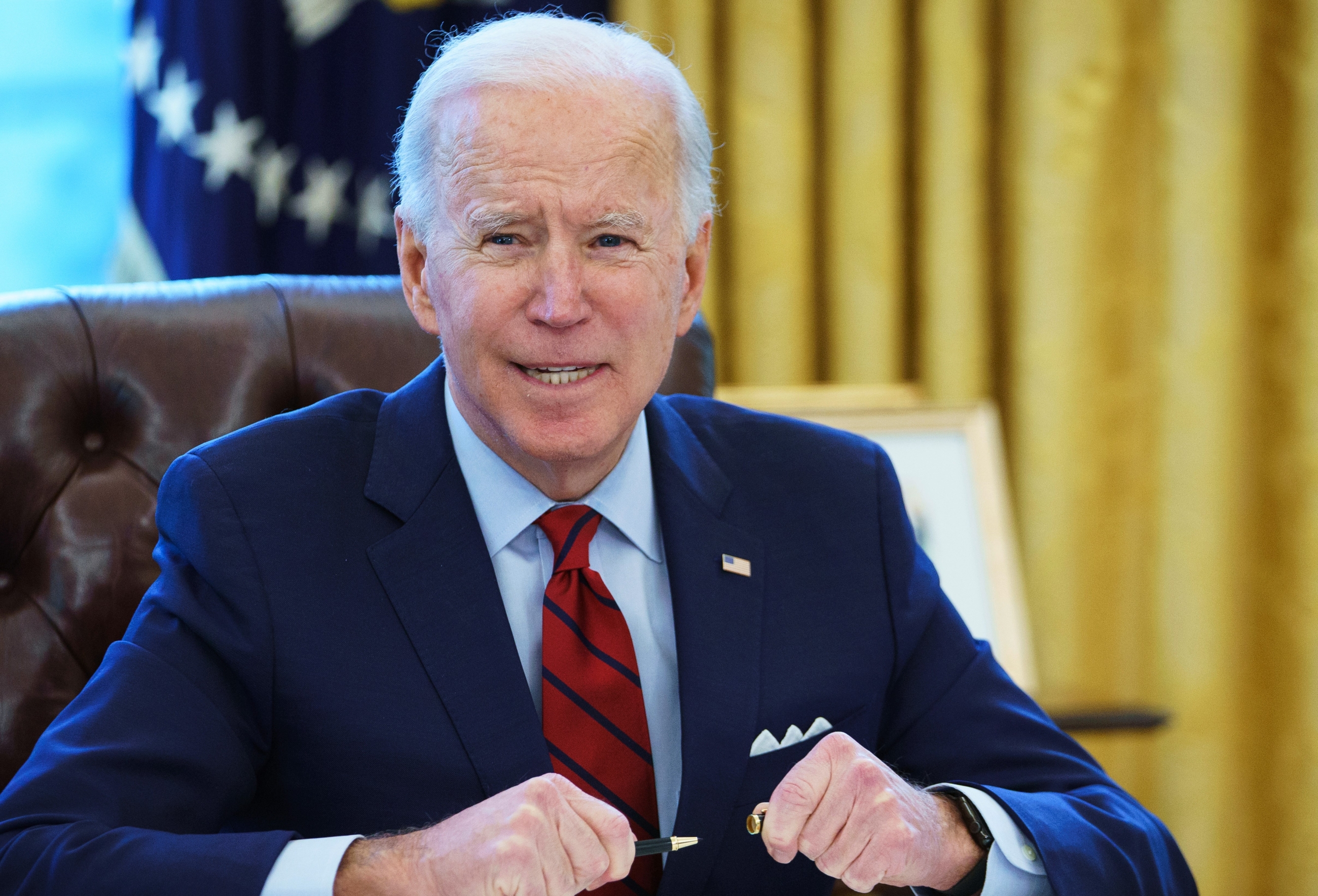
US President Joe Biden has a problem doing what every sinew in his body is craving to do in his assumed role as world leader - restore working relations with a despot in Saudi Arabia and a man he has described as a thug.
Biden's problem can be boiled down to two words: Jamal Khashoggi.
If Biden should need a reminder of the culpability of Saudi Crown Prince Mohammed bin Salman (MBS) in the murder of the journalist, he would do no better than look at Bryan Fogel's meticulously researched account of it in The Dissident.
The film contains two details - one of which I reported on at the time. The first is that Khashoggi's body was dragged into the conference room of the Saudi consulate to be dismembered. The killing was recorded, or worse, streamed live. For whom?
The second detail is a line of the transcript of the tape recorded by Turkish intelligence. It is where the team are instructed to leave two bags of body parts aside. The rest were disposed of either in the acid bath of the well below the garage of the nearby consul's residence, or immolated in the barbecue pit. Why were two bags of body parts flown back to Riyadh? For whom?
New MEE newsletter: Jerusalem Dispatch
Sign up to get the latest insights and analysis on Israel-Palestine, alongside Turkey Unpacked and other MEE newsletters
Uncomfortable moments
Being the seasoned escapologist that he is, Biden would have relatively few uncomfortable moments being reminded by journalists of the words he used as candidate for the Democratic nomination in November 2019. "Khashoggi was murdered and dismembered... at the orders of the crown prince. We are going to make them pay the price and make them the pariahs that they are."
Stopping the war on Yemen is pushing at an open Saudi door. Six years on, the Saudi-led intervention is mired in failure
Biden has frozen arms sales to Saudi Arabia and is examining the sale of F35 fighters and drones to the United Arab Emirates. He has also put his relationship with Riyadh under review.
But let’s not get too excited by either. They are reversible.
Stopping the war on Yemen is pushing at an open Saudi door. Six years on, the Saudi-led intervention is mired in failure. The Houthis have lost the south and control of one port, but they are as firmly established in the capital and the north as they were six year ago. If anything, their reach over the kingdom's soft southern underbelly is greater than it was before.
Moreover, both the Houthis and Iran-backed militias in Iraq regularly knock on Mohammed bin Salman's door to remind him he is still vulnerable to their drones. The latest strikes on an important royal complex in Riyadh took place on 23 and 26 January. The Saudi media claimed the missiles were downed by Riyahd's air defences but kept silent on the target of these strikes and the impact they had on them. There were loud explosions and plumes of smoke sent high over the capital.
The US embassy, on the other hand, issued a security alert.
This war is bleeding the Saudi economy, more than officially admitted. MBS would like nothing better than have Biden step in and instruct him to stop it.
Mixed signals
A temporary halt to arms sales is not the only signal coming from the White House. US forces let it be known they are also "exploring the possibility" of using two airbases in the west of the kingdom, Taif and Tabuk, and the Red Sea port of Yanbu.
I get UN inspections, and sanctions. But extending your military footprint on his kingdom as a way of making MBS feel "the pariah" that he is is a new one on me. Examine closer, however, and the Biden administration could be about to walk back on the "pariah" line that Biden used as candidate.
Its use was notably avoided by Tony Blinken, newly confirmed as secretary of state, in an interview with NBC broadcast earlier this week. Blinken decried Khashoggi's murder as abhorrent and suggested that Washington was reassessing its relationship with Riyadh to ensure it aligned with America's interests and "values".
But he called Saudi Arabia a very important partner. He avoided talking about the crime itself, and when asked in terms by the interviewer, he did not name the man who had ordered Khashoggi's killing.
The options
There is a clear path available to the new administration so obviously shocked and horrified by Khashoggi's murder. Avril Haines, director of national intelligence, vowed to release the unclassified CIA report on who ordered Khashoggi's murder.
All Biden needs to do is to take a principled position and say publicly the US does not support MBS as future ruler of the kingdom
The next obvious step would be for the Biden administration to formerly request that the UN secretary-general form a commission of inquiry into the murder, and on determination of those facts to institute sanctions against those responsible. This course of action was open to Turkey on whose soil the murder took place, but it found itself isolated by the international community.
Will Biden and Blinken go down this path? If they were true to their words, they would.
If the new administration were keen to both keep relations with the kingdom and enforce a punishment on Khashoggi's killers, the other step is to put pressure on the king and leading members of the royal family to remove MBS as crown prince. Biden would not need to arrange a coup, which, if you listen to what former members of the CIA and Pentagon who know Saudi say, would be a highly risky venture.
"You have to remember, these guys [the princes] are scared shitless" of MBS discovering any plans to overthrow him, said a former senior CIA operations official quoted in one well informed assessment.
"If the intent is some form of regime change, that is a very heavy policy call, and [US] policy-makers should deliberate this very carefully and thoughtfully to include contingency off-ramps if things go wrong," the former chief of the Defence Intelligence Agency, James Clapper, said in the same article.
All Biden needs to do is to take a principled position and say publicly the US does not support MBS as future ruler of the kingdom. That in itself would trigger a reaction inside the kingdom.
King Salman has other sons, more educated and experienced than his favoured one Mohammed. His half brother Sultan or Faisal, or his younger brother Khaled. His cousins Mohamed bin Nayef and Prince Meteb are still alive, as is his uncle Prince Ahmed. Each has support in the army and the National Guard.
Each could replace MBS as crown prince, if, and this is a big if, they were confident enough they had the support outside the kingdom to do so. After the humiliation, the theft of their assets, incarceration and in some cases acts of torture that MBS has forced close members of his family to endure, there is no love lost for the crown prince.
No ideology or movement sustains him. Mohammed bin Salman rules by fear alone. His fellow princes, past masters of the art of survival, know this and obey the rules, for now.
But no serious examination of the frail kingdom of Saudi Arabia can absolve the US of the power it holds over the daily functioning of the country. The US is not just a disinterested, powerless, hand-wringing bystander in Saudi Arabia, however much that part will be useful to play in situations like this.
Political change inside the kingdom requires a clear signal from Washington. It always has done throughout history. It does so now. Will they give it?
The Israel factor
If Biden will not go to the UN, nor say he does not support MBS as future king, one major reason for staying on the course set by his predecessor Donald Trump would be Israel.
Biden has made no bones about his support for Israel. In 1986 as a young senator from Delaware, Biden said: "It's about time we stop apologising for our support for Israel. There's no apology to be made, none. It is the best $3 billion investment we make. If there weren't an Israel, the United States of America would have to invent an Israel to protect her interests in the region."
Apart from accepting Jerusalem as the capital of Israel, and the annexation of the Golan Heights, Biden willingly inherits the Abraham Accords in which a growing number of Arab states recognise Israel. The state department has said that normalisation deals are not a substitute for peace with the Palestinians, but that does not change the calculus for a new generation of Arab dictators, like MBS. For him the Palestinians are a side show.
What he needs and wants from Israel is power.
The young prince's tutor, the crown prince of Abu Dhabi, saw Israel as a portal to regional power way back in 2016. As the Middle East Eye first reported then - and this was a year before Mohammed bin Salman's elder cousin Nayef was deposed as crown prince - the 31-year-old Mohammed was given clear instructions on how to become Washington's favourite Saudi prince. Bin Zayed told him that to become Washington's preferred choice of king, he must end the "rule of Wahabbism" at home and court Israel abroad.
This was shrewd advice, which he followed. MBS's close relationship with Jared Kushner and then Donald Trump himself all flowed from that initial visit. The Saudi crown prince's relationship with Yossi Cohen, the director of Mossad, and Israeli Prime Minister Benjamin Netanyahu started before he first flew to Tel Aviv in secret to meet them in person in September 2017.
This came to fruition last year in the Abraham Accords but, as we reported at the time, MBS, one of the founder members of this movement, was not there in person to claim success. This then is the bargain he can make with Biden, who will not leave Israel's side.
With the Abraham Accords, the US can continue its long pullback from the Middle East, as it allows Israel an ever wider diplomatic and security role in Arab nations far from its borders. The crowning of this enterprise would be Saudi recognition of Israel and Israeli military advisers stationed permanently in Saudi Arabia.
The only sure route to this goal goes through the palaces in Riyadh which MBS would occupy when he becomes King Mohammed. For decades Biden could claim that by supporting Israel, he was supporting democracy and human rights in the Middle East.
Now he can not, because it is abundantly clear that Israel's pact is not just with Arab despots, but with the worst ones, many times more repressive than the absolute monarchs and dictators that they replaced.
Israel's pact is not with the Arab people, who if they were allowed any say in the matter would stand by the Palestinians. The Abraham Accords therefore are another nail in the coffin of the cause democracy in the Arab world. This conclusion is inescapable for democrats like Biden.
A pivotal figure
Jamal Khashoggi was a much larger figure in the history of Saudi Arabia than his fellow exiles realise. He was not just one of them, although each tells similar stories of attempts to lure or scare them back by promises of wealth and threats to their family.
In the last few months of his life, Khashoggi came - belatedly and with substantial reluctance - to the conclusion that the House of Saud was doomed. The institution he had been so loyal to was incapable of adapting to the biggest challenge of his lifetime, Khashoggi decided.
The House of Saud could delay and repress the Arab Spring, but it could not stop it, adapt to it or live with it. Apart from homesickness, this was the inner sadness that Khashoggi, an intensely political Saudi patriot, lived and died with.
To call him an American resident is to miss the point. Khashoggi could never have settled in Virginia, and I doubt that Istanbul would have proved different.
Ten years ago in Tahrir Square, to which Khashoggi rushed, he witnessed what he knew in his bones to be an unstoppable and world historical event. Ten years on, the liberated Arab energy, the optimism on display in that square, has been suppressed only with the maximum use of force and bloodshed.
The force required to crush dissent has torn once solid nations apart. So in a very real sense, both in terms of bringing his killer to face justice and in finishing the job that he started, Khashoggi is unfinished business.
For Biden and the US media who championed his cause, Khashoggi is a litmus test.
Will they do the right thing? Will they promote democracy and the democrats in the Arab world, as Barack Obama said he would but appallingly failed to do either? Or will they continue to place US interests and business into the hands of thugs?
I have answered my own question, but I would like Biden and Blinken to do it in their own words. They owe it to my dead friend.
This article is available in French on Middle East Eye French edition.
Middle East Eye delivers independent and unrivalled coverage and analysis of the Middle East, North Africa and beyond. To learn more about republishing this content and the associated fees, please fill out this form. More about MEE can be found here.



